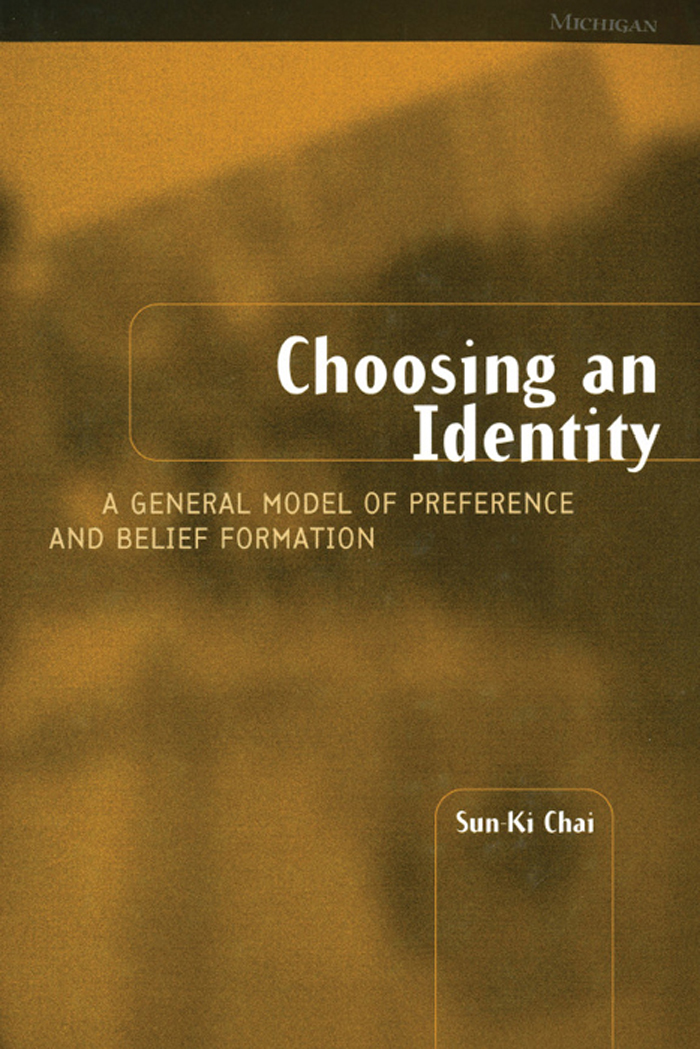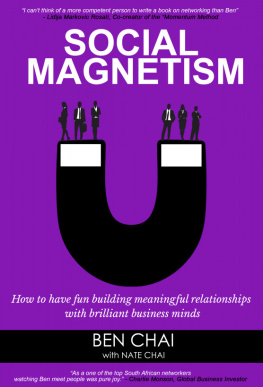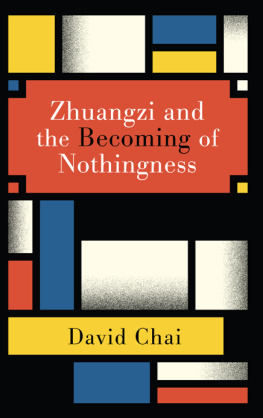Sun-Ki Chai - Choosing an Identity
Here you can read online Sun-Ki Chai - Choosing an Identity full text of the book (entire story) in english for free. Download pdf and epub, get meaning, cover and reviews about this ebook. publisher: The University of Michigan Press, genre: Politics. Description of the work, (preface) as well as reviews are available. Best literature library LitArk.com created for fans of good reading and offers a wide selection of genres:
Romance novel
Science fiction
Adventure
Detective
Science
History
Home and family
Prose
Art
Politics
Computer
Non-fiction
Religion
Business
Children
Humor
Choose a favorite category and find really read worthwhile books. Enjoy immersion in the world of imagination, feel the emotions of the characters or learn something new for yourself, make an fascinating discovery.

- Book:Choosing an Identity
- Author:
- Publisher:The University of Michigan Press
- Genre:
- Rating:3 / 5
- Favourites:Add to favourites
- Your mark:
- 60
- 1
- 2
- 3
- 4
- 5
Choosing an Identity: summary, description and annotation
We offer to read an annotation, description, summary or preface (depends on what the author of the book "Choosing an Identity" wrote himself). If you haven't found the necessary information about the book — write in the comments, we will try to find it.
Choosing an Identity — read online for free the complete book (whole text) full work
Below is the text of the book, divided by pages. System saving the place of the last page read, allows you to conveniently read the book "Choosing an Identity" online for free, without having to search again every time where you left off. Put a bookmark, and you can go to the page where you finished reading at any time.
Font size:
Interval:
Bookmark:

Sun-Ki Chai
ANN ARBOR
T HE U NIVERSITY OF M ICHIGAN P RESS
For my family
Copyright by the University of Michigan 2001
All rights reserved
Published in the United States of America by
The University of Michigan Press
Manufactured in the United States of America
 Printed on acid-free paper
Printed on acid-free paper
2004 2003 2002 2001 4 3 2 1
No part of this publication may be reproduced,
stored in a retrieval system, or transmitted
in any form or by any means, electronic, mechanical,
or otherwise without the written permission
of the publisher.
A CIP catalog record for this book is available from the British Library.
Library of Congress Cataloging-in-Publication Data
Chai, Sun-Ki.
Choosing an identity : a general model of preference and belief formation / Sun-Ki Chai.
p. cm.
Includes bibliographical references (p.) and index.
ISBN 0-472-10701-1 (cloth : alk.paper)
1. Rational choice theory. 2. Group identity. 3. Identity (Psychology) I. Title.
HM495.C4.3 2000
302.4dc21
00060741
ISBN13 978-0-472-10701-8 (cloth)
ISBN13 978-0-472-02395-0 (electronic)
This book provides a general model of preference and belief formation, integrating it with a model of rationality to generate a unified model of preferences, beliefs, and actions. The basic concept behind the model is one that appears under a variety of guises, depending on the social science literature from which it is taken: regret, dissonance, and coherence to name but a few. I argue that there is an essential theoretical unity to these concepts and that, properly defined and constrained, they can form the basis of a general positive model with implications not only for rational choice theories, but also for issues of personal identity and culture. I also argue that identity and culture are not antithetical to rationality but instead are essential to its having any meaning. The central premise of the model is that individuals act to optimize their preferences and beliefs within a set of phenomenological constraints, analogously to the way that they act to optimize actions within a perceived set of structural constraints. Indeed, optimization is seen to occur jointly across preferences, beliefs, and actions, as individuals seek to construct an optimal life plan that constitutes their identities.
By providing this model, I hope to address some the major problems that have plagued attempts to extend the boundaries of the rational choice approach: (1) the ability to make determinate predictions and (2) the ability to make the transition from micro to macrolevel explanation. The model is examined in an extended fashion through three empirical studies that address major unresolved issues in the comparative study of long-term development.
While writing this book, I have incurred debts to a wide range of teachers and colleagues. This book was originally my dissertation at the Stanford poltical science department, and I would like to thank the members of my dissertation committee: my adviser Robert Packenham, Gabriel A. Almond, and John Ferejohn. I would also like to thank the people from whom I received regular comments and advice during various stages of writing: David Abernethy, Michael Hechter, James G. March, and the late Aaron Wildavsky.
I would also like to thank those who provided helpful comments on drafts of chapters, including George A. Akerlof, Jonathan Bendor, Richard Brody, Dennis Chong, William Dixon, Geoffrey Garrett, Kurt Gaubatz, David Grusky, Ted R. Gurr, Dwight Hahn, Satoshi Kanazawa, Sunhyuk Kim, Masaru Kohno, Stephen D. Krasner, David Laitin, Hye-ryeon Lee, Linda D. Molm, Susan Olzak, the late Kenneth Organski, Bertrand Roehner, Tibor Scitovsky, Paul M. Sniderman, the late Amos Tversky, and Barry R. Weingast. I apologize to anyone whose name I have left out inadvertedly. I also would like to thank the members of the Pizza and Politics and the Brown Bag Dissertation Writers groups at Stanford for risking indigestion on several presentations of my main ideas. I would also like to thank the University of Arizona sociology department for being ecumenical enough to hire a graduate from another discipline. Thanks also to research assistants Jason Miller and Kristi Clark for help with copyediting the document.
I would like express appreciation to everyone at the University of Michigan Press, including the successive politics editors: Malcolm Litchfield, Charles T. Myers, Jeremy Shine as well as their staff, for their admirable patience, as well as to two anonymous reviewers and one anonymous member of the executive committee for their detailed comments. Along with the usual thanks, I would also like to offer some apologies. First of all, to the people at Michigan, who were promised a completed manuscript by August 1995. This clearly did not happen! Sorry for the long wait, and I hope that the resulting improvements in the text at least partly compensate for it.
I should also acknowledge my ebtedness to the text-processing language Plain TEX, which was used to typeset this document, and the programming languages Snobol4 and Icon, which were used to write scripts for converting the citations, generating the index, and dealing with other last-minute changes of mind on formatting.
Moreover, as an aside to those scholars whose theories are discussed and compared in this book: the nature of my topic has meant that I have had to skate over an extremely wide range of literature in a relatively short space. Hence, the dangers of superficiality or misrepresentation are omnipresent. Despite my best efforts, I am sure I have not always managed to avoid such dangers. I should also emphasize that each theory is evaluated in light of its applicability to the particular issue being discussed in the relevant chapter, not with regard to its overall usefulness, and I hope my comments will be taken in that light. Nonetheless, to those whose theories I have wronged in some fashion, I offer apologies in advance.
Finally, I would like to apologize to my wife, Hye-ryeon Lee, and my son, Alex, for seeming to walk around in a fog at times while I was writing the book.
The Success and Failure of Rational Choice
The rational choice approach, despite widespread criticism, has reached a point of unrivaled prominence among general theoretical approaches for explaining human action. This prominence extends across the entire range of social sciences. In economics, rational choice remains unchallenged as the dominant, if not defining, theoretical paradigm, and is sometimes referred to simply as the economic approach.
Given all this, it can be said without great controversy that no other theoretical approach in this century has ever enjoyed the same level of ubiquity throughout the social sciences as the rational choice approach enjoys today. Despite this ubiquity, the success of the approach has been very tenuous. Its advance has been accompanied by an intense debate over its relative merit. The approach has been subject to the usual criticism of blatant inaccuracy given by outsiders to any would-be theoretical hegemon and to a predictable fuzzying of its assumptions as it is adapted to a wider and wider range of empirical phenomena. More notably, however, some of the most virulent mere criticisms of the rational choice approach have come from within its own ranks.
Font size:
Interval:
Bookmark:
Similar books «Choosing an Identity»
Look at similar books to Choosing an Identity. We have selected literature similar in name and meaning in the hope of providing readers with more options to find new, interesting, not yet read works.
Discussion, reviews of the book Choosing an Identity and just readers' own opinions. Leave your comments, write what you think about the work, its meaning or the main characters. Specify what exactly you liked and what you didn't like, and why you think so.





![Chai Ling - A heart for freedom: [the remarkable journey of a young dissident, her daring escape, and her quest to free Chinas daughters]](/uploads/posts/book/136516/thumbs/chai-ling-a-heart-for-freedom-the-remarkable.jpg)




